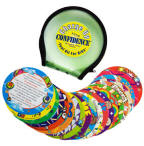

Bullyproof Your Child
for Life
Have Dr. Haber
Speak to Your Group
Dr. Joel Haber is not just a clinical psychologist. He�s a dynamic speaker who connects, empathizes, engages and makes a real difference in the lives of those who have been and are being bullied. more �
Anti-Bullying Resource Library - Respect U.
Teaching Good Sportsmanship
Tips for Parents from the Bullycoach:
- A "winning at all cost" philosophy makes it difficult for adults to teach kids that it's not whether you win or lose, but how you play the game that's important.
- Are you teaching your kids to idolize professional athletes who behave like bullies (get physically aggressive, use trash talk)? Kids are influenced not by what is said about bad behavior but by the specific behavior they watch from these professional athletes
- Are you as a parent behaving well in the stands when you watch your son or daughter? Or, are you screaming or cursing at the coach or your child? Role modeling poor behavior may result in the same behavior in your child
- You set the boundaries of sports behavior. Do you talk to your child after the game is over about poor behavior towards others? Would you approach a coach who role-modeled the same?.
- How do you role model good sportsmanship to your child?
- Be Positive- Offer praise and encouraging words for both teams.
- Be Respectful- Do not openly tease, harass, or berate any child, coach, or referee while attending a sporting event no matter what the age of your child.
- Be clear about your motives. What are the intentions of your child�s sports involvement? Is it to give them a fun, social activity that will help them develop the life skills needed for confidence, skill-building, and sportsmanship? Or, are you looking to ride on their coat-tails to the top of the athletic world for the scholarship to college or beyond?
- Role-modeling is everything: Your behavior goes a long way to showing your child how you feel about sportsmanship. Don�t brag about beating someone, and be careful not to get angry about failures. Your children always watch you!
- Don�t always let your child win- If a child expects a positive outcome for every competitive situation, he won�t learn how to handle losing. Losing will teach him that winning isn�t everything and it�s not the end of the world to lose at a game.
- Don't focus on who won, when talking with your child about a sporting event. Ask him if he had fun and what he liked best about it. Take the focus off winning and put it on fun and effort
- When parents put their kids in the Danger Zone:
- You have to play your best, and everyone�s counting on you: (This put s tremendous pressure on your athlete and creates failure if they don�t succeed)
- If you play well- I�ll be proud of you! (Parental pride only comes with success)
- I�ll lose a lot of money if you don�t have 10 strikeouts today (High pressure for your child to succeed- and sets up modeling for gambling on sports)
copyright © 2009-2011 by RespectU.com. All rights reserved.
terms of use - privacy policy


